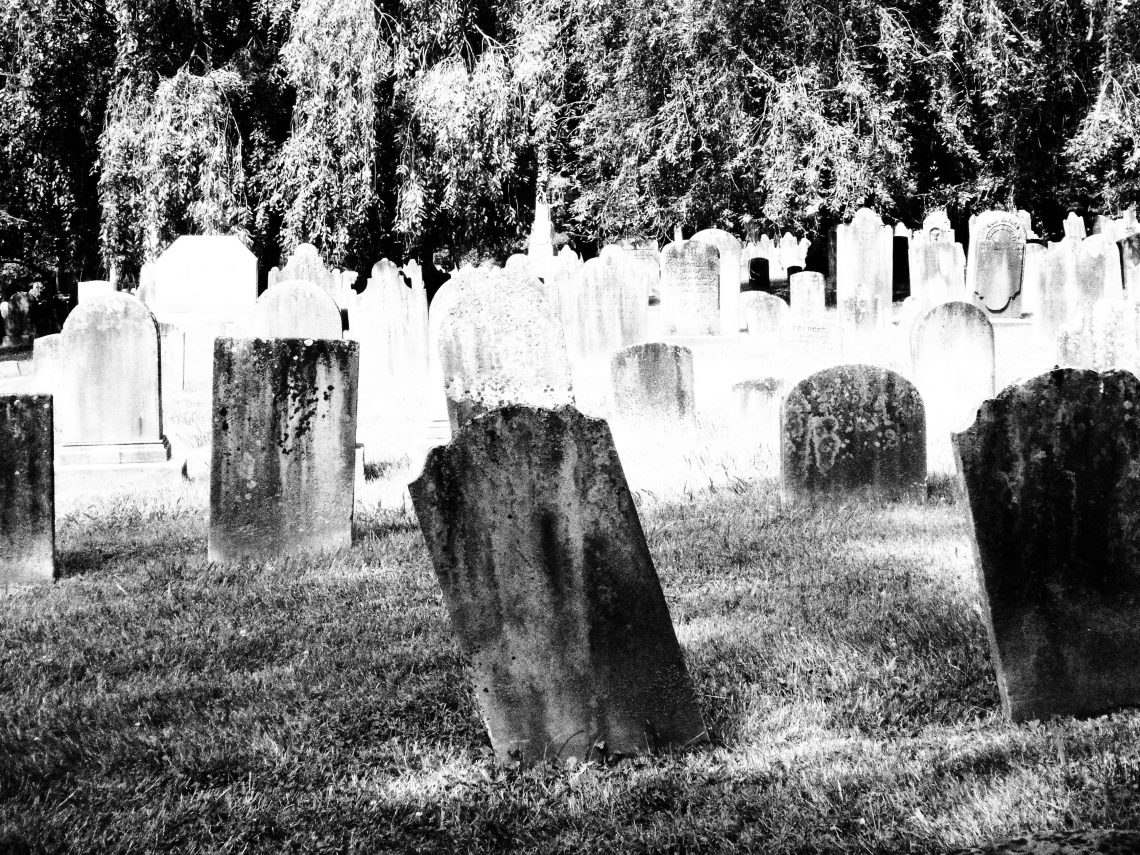
The Clarity of Death
“It is better to go to a house of mourning than to go to a house of feasting, for death is the destiny of every man; the living should take this to heart” (Ecclesiastes 7:2).
My father died recently.
He was always sharp, quick with a pun or a play on words, an accountant by trade who worked until he was seventy-seven years old. He was a student of the Bible for almost sixty years. He did a lot of reading, writing, and “sparring” (personal debating) over the years, quoting folks like Barnhouse and Spurgeon in the process. But dementia overtook him these last few years. He could no longer turn on a radio, or a television, or dial a phone. He struggled to put sentences together. In the last six months or so, he struggled to dress himself; he showered with his clothes on; he tried to wash his hands in a public restroom urinal. The disease had taken so much of him away.
Now when Dad was “normal”, he was far from perfect. Throughout my years on earth, I found him exasperating in more ways than I can mention. Anyone who knew us as a family, knew we were dysfunctional. (The human family is dysfunctional, to say the least.) Despite all that, perhaps because of it, Dad’s life-long hope and trust were placed in Christ alone. He always pointed away from himself and to Jesus. Even near the end, when life consisted of little more than eating, sleeping, and the dog, he loved the things of God. He loved hearing Scripture and he loved worship. That part of him never failed or faded.
God’s final rescue of Dad, taking him out of that failing body, was a blessing in many ways.
But still…
Dad has gone away.
In the weeks since Dad died, I find myself thinking over and over that while alive, each and every one of us can be irritating, a constant drip, drip, drip. Most of us prefer to keep distance between ourselves and things that irritate us. Sadly, those things are very often people we know. The Bible tells us that sin separates and alienates us from God (Isaiah 59:2). Most certainly it also separates us from one another. (Some perceptive writers have pointed out that God’s commands, besides showing how we are to honor and respect Him, are instructions on how we can live in harmony and relation to our fellow human beings. Unfortunately, we continue down other paths.) Another observation is that while someone lives we may hold onto things we believe that person did wrong, especially things done wrong to us; we continue holding them accountable to ourselves and thus we withhold a degree of relationship, forgiveness, and love because, well, maybe we want them to apologize… or we want them to stop being irritating. We hold them indebted to us.
Sin separates.
And we all sin.
We all need repentance. We all need God to rescue us through Jesus Christ.
But then there is death.
I was with Dad as he was dying. I have no idea if he knew his family was there with him. I held his hand as he lay there intermittently breathing, a frail little old guy fighting one final battle. In those moments I thought not of disagreements, disappointments, exasperations, or irritations. I thought only about his leaving. I thought about the impact he had on my life for good. And there was a strong realization that he had done a great many good things during his life. Whether or not he could hear me, I leaned in and whispered, “You did a good job, Dad.” I prayed and thanked God for him. And I asked God to forgive the countless times I did not honor my father as the commandment instructs.
That sin was mine.
It was as though I suddenly realized that for a long, long time I’d been looking at my dad through backwards binoculars.
Clarity.
Everyone dies. It is a fact of life. Has been as far back as anyone can remember. Why then do we avoid thinking about it? Why do we distract ourselves from it? “It is better to go to a house of mourning than to go to a house of feasting, for death is the destiny of every man; the living should take this to heart” we are told in Ecclesiastes 7:2. Yet we do not take it to heart. We clamp our eyes closed as long as possible, until death’s shadow falls upon our path.
But what if we did take it to heart?
Let it bring clarity. Let knowing that we will all die be a constant reminder. Let it spur us on in love for one another. Day by day. Hour by hour. Moment by moment. Yes, our spouse, our parents, our children, our siblings, our friends, and our co-workers can be irritating. (And we to them.) Drip, drip, drip. But let us live knowing each one will pass from this life one day. Their death date is unknown. Are the stupidities and trivialities that divide us so very important that we lose sight of the fact that they could be gone in a moment? Today could be the day we receive that unexpected phone call. This could be the day that our loved one leaves the house never to return. When we arrive at church on Sunday or work on Monday, we might find that other person has already left this world. Must it be only then that we decide the things that we let divide us no longer matter? Let the fact of death remind us to love them NOW. What if this was the last day, week, month, or year we had with them? How would we treat them if we knew our time left together was short? Let us do it now so we have no regrets later.
The living should take this to heart.
In all things, should we not see the end and consider our course now? Everything we do now becomes important in the end. And I tend now to believe that death, in this fallen world, though a curse (Romans 5:12, Romans 6:23, James 1:14-15, etc.) can even be redeemed by God for our benefit. (Romans 8:28, for the good of those who love Him, right?) God allows the fact of death. God allows the constant reminder on the news and in the world around us. How frail and fragile we all truly are. Scripture also gives us constant reminders:
“As a cloud vanishes and is gone…” (Job 7:9)
“People are like a vapor, their days like a shadow that disappears” (Psalm 144:4).
“Just as no one has power over the wind to restrain it, so no one has power over the day of his death” (Ecclesiastes 8:8).
“You do not know about tomorrow. What is your life like? For you are a puff of smoke that appears for a short time and then vanishes” (James 4:14).
Let the fact of death bring clarity to our own lives also. “For death is the destiny of every person, the living should take this to heart.” You and I will also die. It might be you or me before anyone else. We have no guarantee of tomorrow. We might be the ones who do not wake up or return home tomorrow. And after death, according to Jesus Christ and the Scriptures, we will stand before the Judgment Throne of God: “People are appointed to die once, and then to face judgment” (Hebrews 9:27). Are you prepared to die? Are you prepared to stand before God? We see Jesus give warning to those who have not prepared: “But God said to him, ‘You fool! This very night your life will be demanded from you. Then who will get what you have prepared for yourself?’” (Luke 12:20).
Right now, this world and everything in it seem so real but death and everything on the other side of it seems so dream-like and foggy. But one day this will all reverse and we will realize that this world seemed the dream and everything on that side of death is much more real than we could have ever imagined. We live such a short time (Psalm 90:10). But Jesus talked about life after death as being eternal, everlasting. This life becomes a grain of sand in comparison.
Truth be told, Jesus spoke an awful lot about hell as well. He spoke it more than He spoke about love. Of course, when Jesus warned about hell it was loving because love warns of danger. Love tells the truth (1 Corinthians 13:6). He constantly talked about sin and how we should live in obedience to God (in contrast to how we live in constant disobedience). He said there would be a resurrection of the dead, to life or to damnation (John 5:28-29) and a Judgment resulting in eternal life or eternal punishment (Matthew 25:46). Yet He offered hope; He offered Himself as the solution.
Perhaps a thousand years before Jesus, a poet wrote, “Certainly a man cannot rescue [another]; he cannot pay God an adequate ransom price (the ransom price for a human life is too high, and people go to their final destiny), so that he might continue to live forever and not experience death” (Psalm 49:7-9). The poet was thinking about wealth, but God had a different plan:
“I will ransom them from the power of the grave; I will redeem them from death. Where, O death, are your plagues? Where, O grave, is your destruction?” (Hosea 13:14).
Thus, when Jesus says that He came “not to be served but to serve, and to give his life as a ransom for many” (Mark 10:45), we see His purpose. Jesus said He was the only way to come to God (John 14:6) and that rejection of Him means condemnation: “If you do not believe that I am the one I claim to be, you will indeed die in your sins” (John 8:24).
Read with new eyes the most famous passage of Scripture:
“God so loved the world that he gave his one and only Son, that whoever believes in him shall not perish but have eternal life. For God did not send his Son into the world to condemn the world, but to save the world through him. Whoever believes in him is not condemned, but whoever does not believe stands condemned already because they have not believed in the name of God’s one and only Son” (John 3:16-18).
A thief who repented and trusted Jesus as they both were dying on the executioner’s cross heard Jesus promise, “I tell you the truth, today you will be with me in paradise” (Luke 23:43).
To a grieving woman Jesus said, “I am the resurrection and the life. The one who believes in me will live even if he dies” (John 11:25).
Jesus raised the dead when He walked the earth (Luke 7:11-17, Luke 8:40-56, John 11). He Himself rose bodily from the dead on the third day (Matthew 27, Acts 2:29-32, 1 Corinthians 15, etc.). He will raise us all from the dead one day, some day.
Dad believed and trusted in Jesus Christ.
I believe and trust as well.
Do you?
May the clarity of death point us to the One who is the Way and the Truth and the Life (John 14:6).
“For death is the destiny of every man; the living should take this to heart…”
____________________________________
To read more of my columns go to https://blogs.bible.org/author/stephen-j-drain/




One Comment
sonshine
Sorry and Rejoicing as well
Death has its sting and the remaining loved ones feel it most. Yet, we rejoice in knowing what the unbelieving world does not; we will see them again and we will have a mighty time of rejoicing.
May God comfort you
Gaye